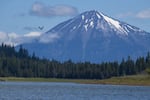Timber companies faced another blow in court this week, after a D.C. Circuit Court of Appeals affirmed the expansion of the Cascade-Siskiyou National Monument in Southern Oregon.

Mount McLoughlin as seen from Hyatt Lake in the Cascade-Siskiyou National Monument, June 21, 2020
Courtesy of Kyle Sullivan/BLM
The decision on Tuesday rejects claims by the timber trade group American Forest Resource Council that expansion of the monument in 2017 conflicts with laws requiring the government to set aside land for timber production.
The ruling is a win for environmental groups, that have sought to protect this incredibly diverse region from logging. The monument lies on the intersection of the Cascade, Siskiyou and Klamath mountain ranges.
This court ruling is similar to another decision by the 9th Circuit Court in April. That lawsuit was filed by the Oregon-based timber company Murphy, which made similar arguments.
In both cases, the courts said the government is well within its power to protect these lands from timber harvesting. The appellate judges stated that under the 1916 Oregon and California Lands Act, the government isn’t solely required to use O&C Lands for timber harvest. And that the act allows the government to use such public lands for “protecting watersheds, regulating stream flow, and contributing to the economic stability of local communities and industries, and providing recreational facil[i]ties.”
The D.C. Circuit Court said because the monument protects the watershed and provides recreational opportunities, it meets some of the aspects of the O&C Act. They said the Secretary of the Interior has discretion to decide how the land should be managed for “permanent forest production.”
The court ruling also said that the expansion of the monument was modest, noting it accounts for less than 2% of the more than two million acres of O&C lands. The court concluded that because of this, the expansion shouldn’t have a major effect on the ability of the government to manage the rest of those lands for timber production.
The monument was established in 2000 by President Bill Clinton and is the first one established specifically to protect the region’s unique biodiversity.
In response, the American Forest Resource Council said the court hasn’t resolved questions about who makes the laws impacting federal lands, and how much authority the president has to override federal law and Congress. It said it intends to, “Continue moving forward until these fundamental questions are answered.”
A request was filed by Murphy in the 9th Circuit Court of Appeals last month seeking another hearing in front of a larger panel of judges.

